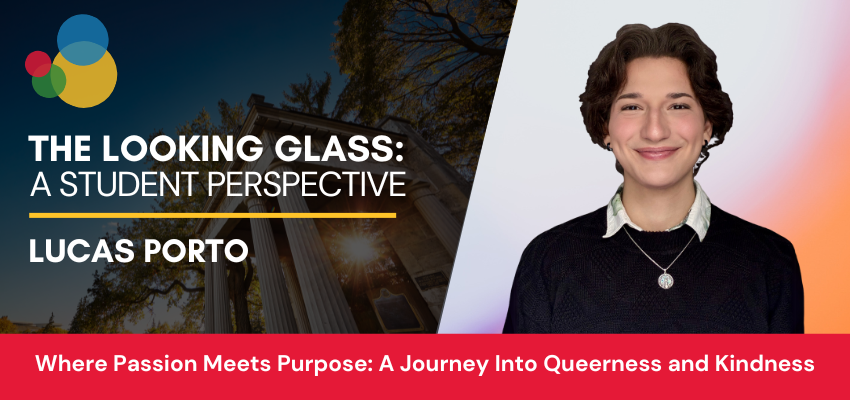The Looking Glass — Where Passion Meets Purpose: A Journey Into Queerness and Kindness

Lucas Porto is a fourth-year Psychology student at the University of Guelph. Throughout his undergraduate studies, Lucas has been actively involved in advocating for LGBTQIA+ youth inclusion. Growing up in a community where acceptance was limited, they faced challenges related to their gender identity and sexuality, which deeply shaped their understanding of mental health and resilience. Drawing from these lived experiences, Lucas is dedicated to creating safe, affirming spaces to better support queer youth.
Where Passion Meets Purpose: A Journey Into Queerness and Kindness
By Lucas Porto, BA Psychology ‘26
Finding Myself by Navigating Identity in Unwelcoming Spaces
From a young age, I’ve been dedicated to helping others, and this passion has inspired me to pursue a career in Psychology. I began the journey of finding direction in my life around the age of 13, and it felt complicated as I came to realize that my sexuality and gender identity did not fit the norms of those around me. I grew up in a rural area, which was not an accepting environment for anyone who dared to be different. I faced bullying, which weakened my self-esteem and made me feel like I did not belong anywhere. As a result, I faced many challenges, which taught me what it means to be different and gave me the tools I needed to live my authentic life safely.
My journey in learning how to navigate the world has involved a lot of consideration for my personal safety, and how openly expressing my identity might impact it. Not all environments I found myself in were safe for me to be my authentic self, and even when I found such a space, I was never quite able to pinpoint exactly what set me apart from others. This had negative impacts on my mental health and diminished my motivation to socialize with my peers. However, as I got older, I was able to access resources I needed to safely explore my identity and support myself as I navigated unfriendly spaces.
Turning Passion into Action and Creating Safer Spaces for Youth

SNAP helps children with better decision-making
Living through these experiences gave me a deeper understanding of the importance of mental health support, inspiring me to pursue an undergraduate degree in psychology with the intention of applying to a clinical psychology graduate program as a way to help youth facing similar challenges. I found Dr. Stephanie Craig’s Supporting Youth Development Lab and was given an opportunity to participate in the work she does with the Child Development Institute (CDI) on the Stop Now And Plan (SNAP) program. SNAP is an evidence-based, cognitive behavioural children’s mental health and crime prevention program designed to help children and youth experiencing behavioural issues and their families develop skills such as emotional regulation, problem-solving, and self-control. The program’s goal is to teach children and youth how to pause and reflect before acting impulsively. Initially created for children aged 6 to 11 with behavioural issues, SNAP has since grown to include various programs targeting specific populations, including youth aged 12 to 19 who are involved in the justice system.
Given my personal experiences, I was eager to assist Dr. Craig with a literature review involving community program adaptation for Black and LGBTQIA+ youth, allowing me to develop a passion for the impactful work that they do. As a result of my involvement in this literature review, I was invited to serve as a youth consultant in the development of program materials that are relevant to the experience of LGBTQIA+ youth within the SNAP Youth Justice program. My role as a youth consultant involves providing queer perspective to guide the development of the new program modules, as well as contributing to the evaluation process alongside Dr. Craig. I had the opportunity to share my lived experiences with the CDI Youth Justice team and work closely on developing modules designed to address key risk factors and teach skills relevant to queer youth.

Throughout this work, we needed to consider the unique challenges faced by this population, such as safety concerns within the justice system and in public spaces, as well as their increased vulnerability to high-risk situations. This involved finding ways to make the program inviting for queer youth without “outing” them, especially given that some participants are in custody facilities where there is a lot of discrimination against perceived differences. This includes individuals who are not queer but act outside of societal ideas of masculinity and femininity. To make this program informative while also prioritizing safety concerns, we had to also consider different delivery formats, such as one-on-one versus group settings, to minimize the risk of bullying. We tried to communicate clearly to the youth that choosing to participate in this program does not imply they are queer; rather, it’s simply a tool to help them explore their identity.
From Experience to Empowerment: Lighting the Path Forward
A common theme throughout the material is that the journey of exploring your identity is personal and should be taken on your own terms. This journey is about the freedom to be who you are—and you are the only one who can determine when, where, and how to express yourself. Some may choose not to come out, while others may choose to do so, and both choices are valid. Ultimately, the decision is always yours.
My goal for this project is to provide youth who find themselves in a similar place to where I once was, with the tools I wish I had growing up, helping them feel more empowered and less alone. I am extremely grateful to Dr. Craig and the CDI team for giving me such an amazing opportunity to share my experiences in a way that empowers others. I look forward to seeing the positive impact this program will have on youth across Canada.